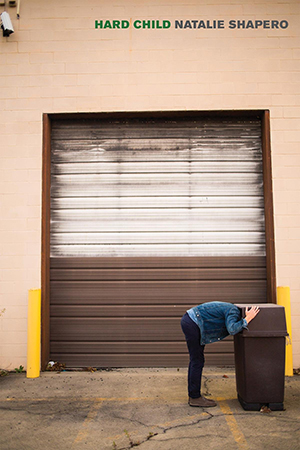Verdad Magazine Volume 24
Spring 2018, Volume 24
Natalie Shapero
Review by Bill Neumire
Natalie Shapero, whose first book, No Object, explored objectification in its many forms, now turns to examine pregnancy, motherhood, history, and memory in her latest book, Hard Child. Although the speaker tells us early on that she “typically hate[s] discussing the past,” (6) the collection begins with an epigraph from Cees Nooteboom’s novel Rituals: “Memory is like a dog that lies down where it pleases.” These are poems without presence in that they are consumed by the past [and the future] and its impact on the speaker’s anxiety; after all, with history comes war and violences, those on a grand scale, as when the speaker reports,
To be, he said, an American, is to find you have lived
your whole small life on the back of some
starving and saber-toothed creature that has,
all the while, been killing and killing and killing (42).
and those on a personal scale, as when she confesses, “How I have killed to live and live / like this, unwell, unwelcome and unmoored and still / I have killed for it and would again” (59). Never dodging culpability, she adds,
Watching football, I need
to see a man die. I need to see the intractable passing
and violence. Of the cruelty ringing the earth,
I am a portion (49).
and she doesn’t stop at accepting responsibility as part of the world’s cruelty; it’s a speaker who frequently rings self-critical. In an interview with HTML Giant’s Rob Stephens, Shapero said, “I am very interested in the phenomenon of degradation and how that gets internalized. One thing I always wonder is when self-hatred began. I mean when in human history.” Eeyore-esque at times, she drops lines like “Whatever I care for, someone else loves it / more, deserves it more” (62). It becomes downright dark and humorously wounding: “It took a box of crullers, handed from person to person around / the workroom, to make me understand I can’t feel joy” (53). The only slim consolation seems to be that “pain is the body’s way of making meaning” (30).
A sense of fatalistic religion—at least in terms of anxiety about god, heaven, hell (she directly alludes to Dante)—pervades these poems, sometimes in concert with the speaker’s self-deprecation, as in “And I know I frustrate God, who built me for endings / And never says anything but YOU HAD ONE JOB” (7). There’s a recurrence of living and dying to the point of mundanity and flatly toned acceptance: “I don’t fear dying— // Look at the past, people have been dying forever” (62). Regularly irreverent, Shapero’s humor and wordplay are often from found chunks of language, or clever retorts to commonly held gems, like her spinning off Marlowe’s thousand ships with “My old love measured his women // in milli-Helens, the unit of female beauty / required to launch only a single ship” (43). She employs all caps and clips of dialogue like “You will / feel, the doctor said, my hand and cold—” (5). When asked about her appropriations, she has said her strategy is “the time-honored tradition of thievery,” admitting that she took one of her humorous quips from a piece of woodcut art at a local hobby shop.
In section two the speaker becomes a mother to a daughter, a country within a country, and the speaker’s parenting anxieties are clear:
What if he does not die but instead is damaged?
What if he must rely on the aid of a dog?
What if he does not care for the dog, and strikes it,
And leaves it out to swelter, and someone yells
I’D HATE TO SEE WHAT YOU WOULD DO TO A CHILD,
And runs off? I don’t want to have a son.
A daughter is simpler. All she needs to learn
Is neither to speed not be caught, and if she is caught,
Make him follow her to a parking lot,
Somewhere bright and unclosing, before she cuts
The engine. Always ask to see a badge (17).
Early on, she wishes her unborn daughter could have a single day of language to “reassure her our whole world is dead and can do you no harm.” The brilliant juxtaposition of birth and death in the book as a whole becomes a form of pyrrhic victory over the anxiety of bringing a child into the world via denying the world’s life and ability to wound, even if it’s an empty “hope.”
BIO: Natalie Shapero was born in Chester, Pennsylvania and earned a BA in Writing Seminars from the Johns Hopkins University, an MFA in Poetry from the Ohio State University, and a JD from the University of Chicago. For the 2011-2012 year, Shapero served as the Steven Gey Fellow with Americans United for Separation of Church and State. She is the author of the poetry collection No Object (Saturnalia, 2013) and Hard Child (Copper Canyon Press, 2017). Her writing has appeared in The Believer, The New Republic, Poetry, The Progressive, and elsewhere, and she is an editor at the Kenyon Review. In 2012-2014, she was a Kenyon Review fellow.
Shapero teaches at Tufts University.

Hard Child
Copper Canyon Press, 2017
ISBN-10: 1556595093
ISBN-13: 978-1556595097
